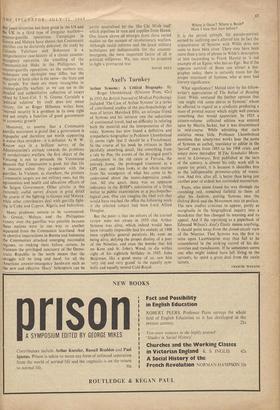Axel's Turnkey
Arthur Symons: A Critical Biography. By Roger Lhombrdaud, (Unicorn Press, 42s.) IN 1933 the British Journal of Medical Psychology included The Case of Arthur Symons' in a series of contributed studies of the psychopathology of men of letters. Havelock Ellis, an intimate friend of Symons and his initiator into the seductions of continental travel, had no difficulty in refuting both the material and the interpretation of this essay. Symons has now found a definitive and sympathetic biographer in Professor Lhombrdaud (it seems right that it should be a Frenchman). In the course of his book he retraces in their painfully absorbing detail, like something from a tale by Poe, the events of the deranged poet's confinement in the old castle at Ferrara, the journey home, the prolonged treatment as a GPI case; and then looks at the whole matter from the standpoint of what has come to be understood about the manic-depressive condi- tion. All else apart, there was an apparent indecency in the RIMP's submission of a living writer to public examination as a psychopatho- logical case. One can imagine the libel writ that would have reached the office the following week if the selected subject had been Lord Alfred Douglas.
But the point is that the editors of the learned review were not aware in 1933 that Arthur Symons was alive, which indeed would have been virtually impossible had his malady of 1908 been syphilitic general paralysis. He went on being alive, defying the proper destiny of a poet of the Nineties, and even the bombs that fell on Kent and St. John's Wood, to die within sight of his eightieth birthday in 1945. John Betjeman, like a good many of us, saw him 'very old and very grand' in the equally sym- bolic and equally mortal Café Royal.
Where is Oscar? Where is Bosie? Have I seen that man before?
It is the period epitaph, the pseudo-portrait earned by outliving one's allotted era. In fact the acquaintance of Symons with Wilde does not seem to have been close There may have been more than a turn of phrase in Wilde's description of him (according to Frank Harris) as 'a sad example of an Egoist who has no Ego. But if the separate survival of Bosie can attract a bio- grapher today, there is certainly room for the proper treatment of Symons, who at least had literary significance.
What significance? Melted later by his fellow- writer's appreciation of The Ballad of Reading Gaol, Wilde ventured the further opinion that 'one might risk some shares in Symons,' whom he affected to regard as a syndicate producing a mass of printed matter which might well contain something that would appreciate. In 1924 a sixteen-volume collected edition was entered upon by Martin Seeker, but it was discontinued in mid-course. While admitting that such statistics mean little, Professor Lhombreaud mentions that ninety-two works bear the name of Symons as author, translator or editor in the 'period' years from 1885 to his 1908 crisis, and ninety more thereafter. If The Symbolist Move- ment in Literature, first published at the turn of the century, is almost his only work still in repute (or print), it is because it identifies him as the indispensable promoter-critic of transi- tion. And this, after all, is better than being just another poet of ardent but outmoded mannerism.
Yeats, who alone found his way through the trembling veil, remained faithful to them all after his fashion, putting Symons into the Oxford Book and the Movement into its preface. The new studies continue to appear, partly as marginalia in the biographical inquiry into a decadcnce that has changed its meaning and its appeal. And if the reprinting as a paperback of Edmund Wilson's Axel's Castle means anything, it should point away from the closed-circuit view of the Nineties. That Symons was the first to seize upon Lauttdamont may thus fail to be remembered in the striking record of his dis- coveries and transfusions. If he sometimes seems one who might indeed have left living to the servants, he spied a. great deal from the castle turrets.
FRANCIS WATSON


































 Previous page
Previous page